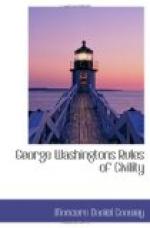22d. Shew not yourself glad at the Misfortune of another though he were your enemy
Hawkins i. 32. When thou shalt heare the misfortunes of another, shew not thy selfe gladed for it, though it happ to thy enemy, for that will argue a mind mischievous, and will convict thee of a desire to have executed it thy selfe, had either power or opertunity seconded thy will.
(Nothing corresponding to Rule 22 is found among the Maxims of the Jesuit fathers; but the later French book has the following: “Shew not your self joyful and pleased at the misfortunes that have befallen another, though you hated him, it argues a mischievous mind, and that you had a desire to have done it your self, if you had had the power or opportunity to your will.") 23d. When you see a Crime punished, you may be inwardly Pleased; but always shew Pity to the Suffering Offender.
Hawkins i. 33. When thou seest justice executed on any, thou maist inwardly take delight in his vigilancy, to punish offenders, because it tends to publique quiet, yet shew pity to the offender, and ever Constitute the defect of his morality, thy precaution.
[Sidenote: This Rule has been nearly destroyed by mice.]
[24th. Do not laugh too loud or] too much at any Publick [spectacle, lest you cause yourself to be laughed at.]
Hawkins i. 34.
Laugh not too much or too Loud, in any publique
spectacle least for
thy so doing, thou present thy selfe, the only
thing worthy to be laughed
at.
25th. Superfluous Complements and all Affectation of Ceremony are to be avoided, yet where due they are not to be Neglected
Chapter iii. 1. Quoy qu’il soit bon de s’epargner vn trop grand soing de pratiquer vne ciuilite affectee, il faut pourtant estre exact a en obseruer ce qui est necessaire & auantageux pour faire paroistre une belle education, & ce qui ne se peut obmettre sans choquer ceux auec qui l’on converse.
Though it is right to avoid too great care in practising an affected civility, yet one must be exact in observing what is necessary and advantageous in order to show a good education, and all that cannot be omitted without shocking those with whom one is conversing.
26th. In pulling off your Hat to Persons of Distinction, as Noblemen, Justices, Churchmen, &c make a Reverence, bowing more or less according to the Custom of the Better Bred, and Quality of the Persons. Amongst your equals expect not always that they Should begin with you first, but to Pull off the Hat when there is no need is Affectation, in the Manner of Saluting and resaluting in words keep to the most usual Custom.




